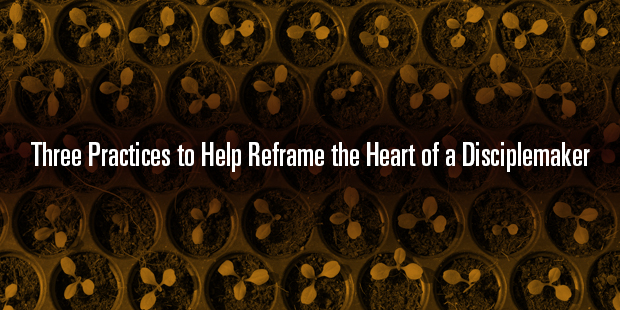
Three Practices to Help Reframe the Heart of a Disciplemaker
When asked, there are many reasons church leaders give for lack of effectiveness in making disciples. Here are a few common responses:
“We have uncommitted volunteers”
“We reach many distracted families”
“We suffer from ineffective curriculum”
“We find ourselves with unavailable leadership”
“We are experiencing diminishing giving”
“We need to get beyond our under-performing staff”
“We are stuck through over-complex processes”
While the above may be resonant, they are likely not the actual reason your church continues to struggle to make disciples. From observation of hundreds of churches over the past few years, disciples are not made for one singular, and strikingly simple, reason: actual, biblical discipleship takes much more time than expected and produces very little immediate return on investment.
Herein lies the problem. Rather than thinking long-term process, and setting expectations five to ten years down the road, we lead through short-term programming. We lead by constantly changing the discipleship curriculum, schedule or structure every few months. We lead with the expectation that discipleship requires only a season, rather than years of nurture and growth.
The approach and practice of making disciples is more like running a tree farm than tending a backyard vegetable garden.
Vegetable gardens, while taking some time – maybe a few summer growing months – yield a rather immediate harvest and tangible results. Within weeks, seeds germinate, vines grow and blooms emerge. Soon after, windowsills and countertops are overflowing with vegetables and fruit, ready for eating, canning and freezing. And as the cool mornings of fall consistently make their annual appearance, plants are removed, soil is turned and beds are prepared for a new, fresh season of production.
Tree farming requires a completely different process and outlook. Saplings take root – not with an expectation of months-long nurturing – but years of grooming, tending and shaping. The average 8-foot Christmas Tree takes seven to twelve years to mature and be ready to stand proudly as the centerpiece of holiday celebrations. Running a tree farm requires a commitment to think long-term and necessitates a patient discipline for measuring results in observable quality, through the health of the plant, rather than numeric quantity.
When we treat discipleship as a seasonal activity, expecting immediate results we produce undernourished and unprepared followers of Christ. We then blame volunteers, travel baseball, or ineffective systems for our own misunderstanding of the nature of discipleship.
Here are three practices for 2017 to help reframe the heart of the disciplemaker through the mind of a tree-farmer.
- Mark time in seasons of a life, not seasons of the year… because discipleship takes more than two or three semesters of study. What would we develop in a young married husband if we pictured a healthy tenth anniversary? How would an incoming sixth grade girl be biblically prepared for the upcoming challenges of high school? What are the spiritual habits of a senior adult that develop a next generation of Christ-likeness?
- Measure health of each individual, not the number of individuals who appear healthy… because not all growth is spiritual growth. What are the marks of a growing disciple in your context? What are the daily habits and practices of growing followers that produce and reproduce dependence on Christ? What small indicators can be identified that build to big steps of growth
- Celebrate annual multiplication of a few, not seasonal addition of the many…because what is celebrated gets replicated. How might you point beyond collective programs toward individual development? What rites of passage in your culture would mark significant progress in spiritual growth? What consistent language can you develop to encourage participation from every church member?
Want to learn more about developing disciplemakers? Connect with an Auxano Navigator.

Tags: Bryan Rose, Disciplemaker, Disciplemaking, Discipleship, Making Disciples












